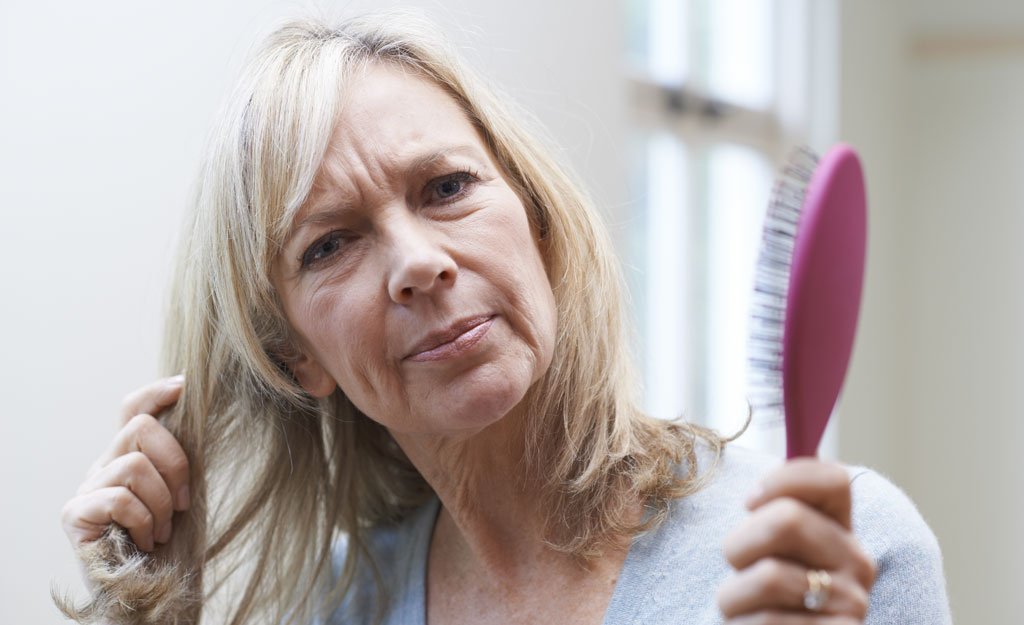How to Prevent Hair Loss
Hair is actually an extension of the skin – like your skin, it's a direct reflection of your internal health.
A nutrient dense diet is essential for creating strong and healthy hair. Restrictive diets and food plans can cause dull, dry and thinning hair. There are many causes of female hair loss and one of them is a hormonal imbalance. Other common causes of hair loss include low thyroid function, autoimmune conditions, stress, and nutritional deficiencies.
Hormones and hair loss
Hair loss is usually a direct result of fluctuating hormone levels. Two main hormones are involved in hair growth: oestrogen and testosterone. Oestrogenic alopecia is the most common type of hair loss among women experiencing hormonal imbalance and is directly attributed to a fall in oestrogen levels. Oestrogen helps hair grow faster and stay on the head longer, leading to thicker and healthier hair.
Oestrogen is not the only hormone that comes into play during hair loss. The male hormone androgen also increases as oestrogen levels decrease. This causes androgenic alopecia, another form of hair loss. An androgen known as dihydrotestosterone (DHT) appears to bind to hair follicles and forces them to go into telogen (resting phase) sooner than normal. This causes the new hairs to grow ever thinner with each cycle of hair growth. Testosterone also shrinks hair follicles, causing hair loss on the scalp but resulting in greater production of hair on the face.
Keeping your hair healthy
The following are general suggestions to improve the quality of the hair:
- Hormones have a significant impact on the growth rate and quality of hair. Generally hair loss is associated with the ovaries (low oestrogen, high testosterone), adrenals and thyroid. However the opposite can also be true with elevated oestrogen in conditions of oestrogen dominance. One of the first improvements taking Happy Hormones is improved hair quality and growth rates. In a poll conducted in our private group over 70% reported improvements along with nail growth as well.
- Ensure that you include quality oils in your diet to properly moisturise the hair shaft so that hair can grow strong and not break easily (dry, brittle hair). Essential fatty acids are crucial for keeping your hair strong, pliable and shiny. Fish, nuts, seeds, avocados, olive oil and coconut oil make great additions to your diet as they help increase these beneficial oils.
- Consider taking an oil supplement such as fish oil, evening primrose oil, flaxseed oil, hemp seed oil or Omega 3-6-9 combined to provide the body with the rich oils needed for hair growth.
- Silica, zinc, biotin, collagen and folic acid are also great supplements that provide building blocks for hair growth.
- Poor digestion means that you are not able to absorb the proper ingredients to build strong hair. Address any digestive complaints such as bloating, constipation, diarrhoea, reflux, and indigestion. You can do this by using a digestive tonic (lemon juice, digestive enzymes, Swedish bitters, apple cider vinegar or herbal bitters) and incorporating probiotic-rich nutrients fermented foods into your diet.
- Address adrenal and thyroid insufficiencies. Women who experience thinning hair during midlife and beyond often have hormonal imbalances associated with the adrenal, thyroid and reproductive glands.
- Check your medications as some may have hair loss among the side effects.
Good circulation is also essential for healthy hair and this includes daily exercise, skin brushing, head massage, and hair brushing. Try using this stimulating scalp treatment:
- Combine 50 ml Jojoba oil with these pure essential oils in a glass bottle:15 drops Rosemary, 10 drops Lavender and 5 drops Cedarwood.
- Shake well. (The mixture can be stored in a cupboard.)
- Apply ½ teaspoon or more and massage the oil into your scalp with your fingertips.
- Leave for 1 hour and then shampoo off.
- You can redo this treatment every week.
Foods for hair loss
Fish: Increase your fish intake. Best kinds are wild-caught, cold-water fish like salmon as they are loaded with lean, anti-inflammatory protein and omega-3 fatty acids which are excellent for hair health.
Grass-fed meat: Iron-rich protein like grass-fed beef can really help keep hair healthy. Hair follicles and roots are fed by a nutrient-rich blood supply. If you have an iron deficiency (a common underlying condition with hair thinning), the follicle becomes nutrient-deprived. This negatively affects the normal cycle of hair growth and can lead to excessive shedding.
Bone broths: Bone broths are easy to absorb and packed with nutrients, collagen, and minerals necessary for new hair growth.
Iron-rich vegetables: Increase your intake of beetroot, lentils, kale, spinach and dark, leafy green veggies for healthier hair.
Vitamin C: Increased vitamin C intake helps your body absorb the iron it needs. Citrus fruits like lemon and lime, berries, guava, kiwi, papaya and green veggies such as broccoli are great sources of natural vitamin C.
Vitamin A: Vitamin A is great for a healthy scalp, which is essential to healthy hair growth. Vitamin A helps make the sebum that conditions your scalp. Orange veggies, as well as carrots, pumpkin, sweet potato and kale, are high in beta-carotene and vitamin A.
Biotin-rich foods: Biotin helps with thinning hair. Some foods rich in biotin are eggs, almonds, mushrooms, cauliflower, and spinach.
Zinc-rich foods: Zinc is key to overall hair health and a deficiency is linked with hair loss. Zinc is involved in over 300 different enzyme productions in the body including tissue growth, hair growth, and repair. Examples of foods high in zinc are seafood (including shellfish), seeds and chickpeas.
Summary
Losing hair can definitely be reduced and improved if you take the right strategies. Look at your hormonal and endocrine system imbalance and experiment with different dietary changes. Supplementation of vitamins and minerals can help however first place to look is balancing hormones via Happy Hormones.






















